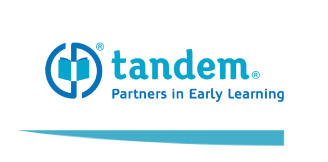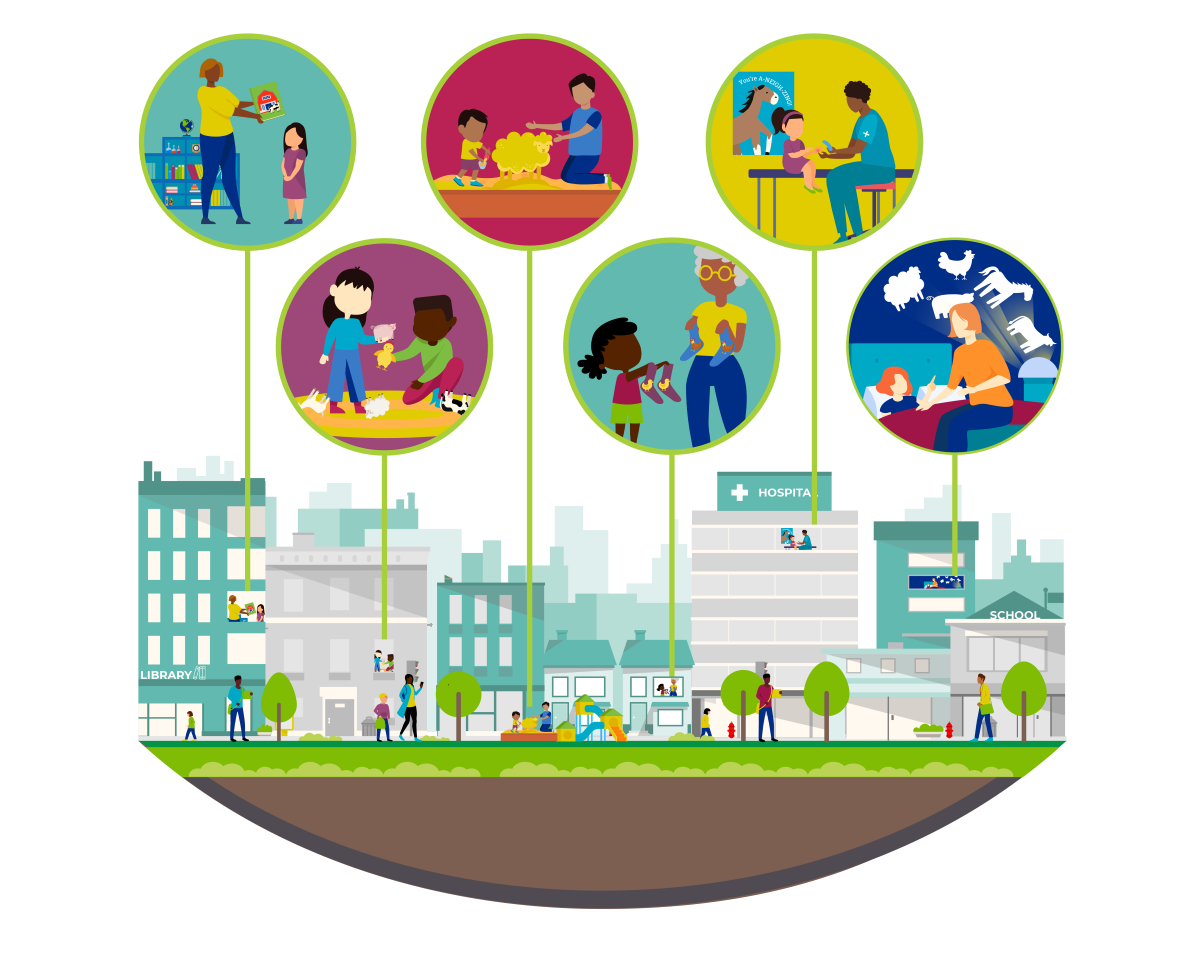Once Upon a Time a Refugee: Stories of Resilience and Strength
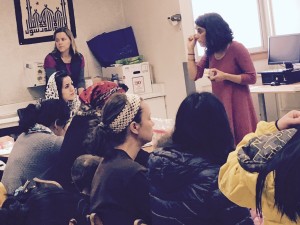
Author Kajal Shahali leads parents in a workshop on early childhood brain development at Refugee & Immigrant Transitions (RIT) in Oakland in 2016.
June 20, 2016, marks the 16th year we join the United Nations in celebrating refugees around the globe for World Refugee Day. Today, nearly 60 million people have been displaced due to conflict, persecution, and disaster; 60 million people with 60 million stories of struggle, but also 60 million stories of endurance, resilience, and strength.
I have thought of a million different ways I should write this post to highlight the early learning opportunity gap for refugee children and how book-sharing routines can be a small, but impactful first step in closing that gap. I thought of numbers, statistics, and other data that could really blow my reader’s mind and help me convey the message. In all honesty though, it was not until I got on a plane in April to visit my family in Iran after four years that I realized something about my own story. As I sat on the plane, reflecting back on the ten years I have lived in the United States and anticipating returning to a country I called home for so long, I realized no numbers could fully capture the story of my immigration and the joy I felt to be going back home. It was—and still is—the stories of my childhood, my journey from Iran to the United States, my experiences as an immigrant and as a student at UC Berkeley, and as an advocate, that sum up who I am today and who I will be in the future.
So in highlighting the early leaning gap for refugee children, numbers are important, but they may not suffice. Instead, I want to focus on telling stories. There is nothing more important than creating a space where families’ personal stories may be passed on from mothers, fathers, and family members to their little ones. To close the gap, perhaps the first step must be to create a safe space where every family’s stories of “how we got here” and “what we hope for the future” is encouraged and respected.
Who is a Refugee?
We have heard the term refugee often in the past few months. We see it in the news, on social media, and hear it mentioned during presidential debates. We know the Syrian conflict alone has displaced more than 4.5 million people to its neighboring countries. We know about boats full of people who risk traveling across the Mediterranean in hopes of finding a safer destination, and we hear about all the ones that do not make it to shore. We know how much Canada has shown willingness to accept refugees, and we are familiar with how much the United States is divided over the issue.
There are many reactions to this exposure to the refugee struggle. Some have become fearful of it, while others are very passionate about it. Still, others may choose to completely ignore it. Living in the United States, it can be easy to forget that refugees are not just groups of people living oceans apart from us, but that they are in fact the ordinary people in our communities here in the United States.
Refugees are our neighbors. They work in our local bars and cafes, and they sit with us in our college classes. Their children attend the same K-12 schools as our children. In 2015, close to 70,000 refugees were resettled in the United States. California is the second largest state to resettle refugees in the country; and the Bay Area is the home to about 600 refugees every year. Whether we are fearful of refugees, unaware of their struggles, or their passionate advocates, we often forget about the stories that make these ordinary people a refugee; the very same stories that can help all of us transcend differences and connect on a deeper human level; the very same stories that help all of us be ordinary and extraordinary.
Where Opportunity Gaps Begin
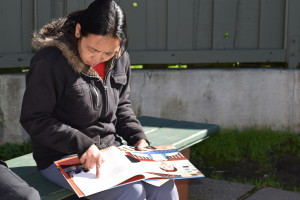
A mother practices her Read Aloud skills and her English during Tandem’s interactive book-sharing workshop at Refugee & Immigrant Transitions in 2016. Many parents share their excitement to participate in classes that give them a chance to practice their English, bond with other parents in their communities, and take advantage of early learning support for their children.
Refugee resettlement in the United States is a lengthy and rigorous process. Each refugee is thoroughly selected, vetted, and resettled by one out of only nine resettlement agencies in the United States. Funded by the Office of Refugee Resettlement (ORR), these nine resettlement agencies help newly arrived refugees settle into local communities. In their work, each agency receives funding from ORR to help refugees resettle in particular cities based on their background, number of relatives, affordability of life, and the existence of their community. This money is not given directly to the family, but is rather spent on behalf of the family by the agency to ensure that the family has access to food, shelter, and basic supplies for at least their first 30 days upon arrival. Meanwhile, the agencies make an effort to provide resources within these first 30 days that connect the families to social benefits and employment services available for refugees so they may become self-sufficient as soon as possible. While the agencies provide services for refugee families for up to 90 days (and sometimes to 120 days), the initial financial assistance is intended only for the first 30 days of arrival, and it is expected for refugees to connect with employment services after their first month in the United States.
Limited resources and constraints in accessing information due to language barriers and prioritization of employment over orientation and education into systems in their new country often cause the refugee families to focus solely on finding employment. Mothers are likely to become the primary caregiver of children under the age of five at home. Often times, this very situation limits many refugee mothers’ access to English classes, employment opportunities—and most importantly—access to childcare facilities and early learning resources for their children. Without taking advantage of English classes and opportunities for mothers to support the family income with a job of their own, many families may have a difficult time becoming fully self-sufficient within the allotted 30-day timeframe. Further, depending on their children’s age, these limitations to educational services and family resources can impact children’s adjustment into the K-12 school environment and social integration later on, making the transition for the youngest children as complicated and as difficult as it is for any other newly arrived refugee student.
Sharing Stories Strengthens Families
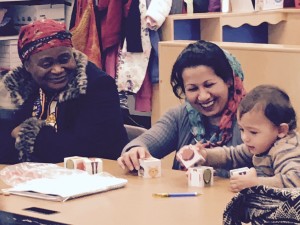
Sharing stories in home languages provides a strong foundation for young children resettling with their families in Oakland. As parents and older siblings learn English and begin talking, reading, playing and singing with them, children build the early language and literacy skills they need to be kindergarten ready.
As a former Education Coordinator and Refugee Resettlement Caseworker at the International Rescue Committee, and as a Community Literacy Specialist with Tandem, some of my favorite topics of discussion include education, refugees, and early learning. Having worked with newly arrived refugees in Oakland for three years, hearing their stories of leaving home and bearing witness to the challenges they faced in their new country—and often times frustrated at my own limited capacity and resources to help see them through—I realized that so many of us know about refugees, but do not know of refugees in our own communities. I noticed how many stories of those refugees already living here in our own neighborhoods go unnoticed; stories that—if given care or thought—can help build a foundation of empathy and compassion.
For these families, most days and nights are spent navigating a new way of living, a new culture—a new everything. I saw fathers work two, sometimes even three jobs. I saw many mothers, sometimes illiterate in their own language, looking after their little ones, too intimidated by their lack of English skills to even look for childcare. I also saw mothers courageously taking it upon themselves to find classes—and bringing their little ones along to each session—in hopes of improving their English enough to find employment. In refugee resettlement, there is an expectation for continuous upward mobility to make a better future for oneself and for one’s children. So much emphasis is put upon the pursuit of a better future that the preservation of the identity, culture, tradition, language, and the story of “how we even got here,” is thrown onto the backburner. It is almost as if the system forces refugees to become too busy with adjusting to their new life that there isn’t much time to reflect and share stories about the experience. Talking, sharing stories, hearing stories in their own language as well as in English not only connects families to their heritage, but also strengthens bonds and helps their youngest children adjust to life in their new community.
Closing the Early Learning Opportunity Gap for Refugee Children and Families
To close the opportunity gap in early learning and early education for refugee children in our communities is to acknowledge the lack of access to resources. There are several ways early learning organizations, educators, and community leaders may help refugee families find the resources they need:
- Encourage refugee families to nurture a strong, positive connection to their ethnic heritage and maintain their home language to develop a bi-cultural identity
- Help service providers maximize family and community input and build upon cultural assets in order to successfully engage and serve newcomer communities
- Encourage creative collaboration among service providers and communities to facilitate a broad range of services for children, youth, and their families that support healthy development and long-term integration
- Assist educators in providing culturally and linguistically appropriate support and services aimed at strengthening families and their ability to access educational systems
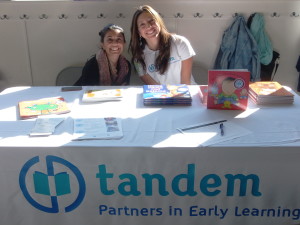
Kajal Shahali pictured with Dulce Torres-Petty at an event with RIT. Giveaway books and tip-sheets on sharing books and stories with children help families establish daily book-sharing routines.
At Tandem, Partners in Early Learning, we know that the ultimate hope is for refugee families to have access to quality childcare as soon as they arrive and for them to be self-sufficient and fully integrated in their community. However, if that is not possible at this very moment, we are not going to stop there. We want to meet our families where they are, not where we think they should be. So we have teamed up with the refugee community in Oakland and Refugee & Immigrant Transitions (a community-based nonprofit serving high need refugee, asylee, and immigrant newcomers to become self-sufficient in their new communities) to gradually help close the early learning opportunity gap.
Since February 2016, Tandem has met with the adult students at Refugee Transition’s Newcomer Parent English course at Franklin Elementary School once a month to provide a series of workshops on book-sharing and early learning topics. We have talked to these refugee families about early childhood brain development, language and literacy acquisition, and the role that daily book-sharing routines play in getting children kindergarten ready. We learned about the activities these families do together at home or on their walks to English class that positively impact their children’s early learning. But most importantly, we have talked about preserving their identity and culture by sharing their own stories in the language they are most comfortable with and the enormous impact that can have upon their young children. To encourage families to talk, read, and sing together in their home languages, Tandem provides free books in some of the languages spoken by the largest refugee populations in Oakland (Arabic and Farsi), so no one feels that book-sharing has to happen only in English.
So in celebrating refugees and their stories of struggle, endurance, resilience and strength for World Refugee Day, I hope we use stories to shed light on our shared humanity and close the opportunity gap in early learning and literacy for all children in our communities and around the world.
For more information on sharing books and developing children’s early language and literacy skills, check out Tandem’s online resources.
Learn More
The UN Refugee Agency – Read more about refugee families and their stories.
The East Bay Refugee Forum – Learn more about how you may get involved with refugees in the Bay Area
The International Rescue Committee in Northern California – Find donation and volunteer information on local regional offices and the opportunities these offices provide for refugees to thrive in America.
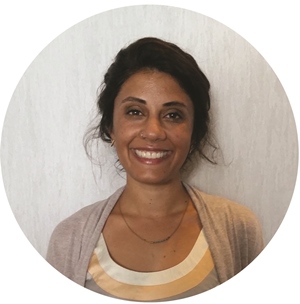
Kajal Shahali
Youth Program Manager at Refugee & Immigrant Transitions
Kajal Shahali is a former Community Literacy Specialist at Tandem. Since 2019, Kajal was been working at Refugee & Immigrant Transitions in Oakland, overseeing RIT’s after-school and youth tutoring/ mentoring programs.
